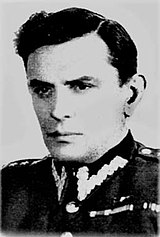Stanisław Zarakowski
Stanisław Zarakowski | |
|---|---|
 Colonel Stanisław Zarakowski | |
| Personal details | |
| Born | 7 November 1907 Svolna, the Vicebsk government, Dryssa county Russian Empire |
| Died | 11 April 1998 (aged 90) Warsaw, Poland |
| Citizenship | Polish |
| Military service | |
| Allegiance | Polish People's Army |
| Branch/service | Chief Military Prosecutor Office |
| Rank | Brigadier general (Revoked) Private |
General Stanisław Zarakowski (7 November 1907 – 11 April 1998) was a chief military prosecutor in the People's Republic of Poland who was famous for his role in several trials of Polish Underground State officers which resulted in many death sentences.[1]
Zarakowski was born to a local landowner in Svolna village (Belarusian: Свольна) in Vilna Governorate (Russian Empire, present-day Belarus). His family's estate was nationalized during the Bolshevik revolution when he was ten years old. They moved to Vilnius, where Zarakowski graduated from the law faculty of the Wilno University (then in the Second Polish Republic). During World War II he fled to the Soviet Union and arrived back in war-torn Poland with the Soviet-sponsored Polish People's Army. A hardline Stalinist, Zarakowski was assigned a job with the Chief Military Prosecutor Office and quickly rose to become the Chief Military Prosecutor of the People's Republic of Poland.[2]
Stalinist reign of terror
[edit]Zarakowski was the main prosecutor in various Stalinist trials including the infamous Trial of the Generals in 1951 against commanders of the Armia Krajowa including General Stanisław Tatar. The trial resulted in over 20 death sentences against high-ranking officers (later classified as court murders by the Institute of National Remembrance).[1] Zarakowski conducted the trial of Kazimierz Pużak and other politicians of the Polish People's Party (PSL) shortly before the so-called people's referendum of 1946, as well as the Stalinist show trial of the Roman Curia of Kraków.[3] The pronounced death sentences were not enforced although Father Fudali died in unexplained circumstances.[4] Throughout the 1950s the Ministry of Public Security with Dir. Julia Brystiger (née Prajs) at the helm of the 5th Department, incarcerated and routinely tortured Roman Catholic priests investigated for "treason". Before 1953 already, 37 of them were killed including 54 monks.[5][6]
Zarakowski was a Communist party advisor to MON along with General Roman Romkowski (Natan Grinszpan-Kikiel from Moscow) and a few other officials.[7] He was also the man to order the presiding judge to sentence Capt. Witold Pilecki, the "hero of Auschwitz" to the death penalty, according to IPN institute. Zarakowski was fired from his government job in 1956 during the Polish October revolution and his surviving victims were released.[8]
Promotions
[edit] (Second Lieutenant) – 1935
(Second Lieutenant) – 1935 Porucznik (Lieutenant) – October 1945
Porucznik (Lieutenant) – October 1945 Kapitan (Captain) – December 1945
Kapitan (Captain) – December 1945 Major (Major) – May 1946
Major (Major) – May 1946 (Lieutenant colonel) – December 1946
(Lieutenant colonel) – December 1946 Pułkownik (Colonel) – July 1947
Pułkownik (Colonel) – July 1947 Generał brygady (Brigadier general) – October 1953
Generał brygady (Brigadier general) – October 1953 Szeregowy (Private) - degradation in 1991
Szeregowy (Private) - degradation in 1991
Awards and decorations
[edit] Order of the Banner of Labour, 2nd Class (1949)
Order of the Banner of Labour, 2nd Class (1949) Knight's Cross of Order of Polonia Restituta (1946)
Knight's Cross of Order of Polonia Restituta (1946) Cross of Valour, twice (1945)
Cross of Valour, twice (1945) Silver Cross of Merit (1946)
Silver Cross of Merit (1946) Medal for Oder, Neisse and Baltic (1946)
Medal for Oder, Neisse and Baltic (1946) Medal of the Armed Forces in the Service of the Fatherland (1955)
Medal of the Armed Forces in the Service of the Fatherland (1955) Czechoslovak War Cross 1939–1945 (Czechoslovakia, 1949)
Czechoslovak War Cross 1939–1945 (Czechoslovakia, 1949) Medal "For the Victory over Germany in the Great Patriotic War 1941–1945" (USSR)
Medal "For the Victory over Germany in the Great Patriotic War 1941–1945" (USSR)
Notes and references
[edit]- ^ a b Maciej Łuczak, with Ryszard Kamiński (February 1999). "Stalinowscy zbrodniarze przed sądem III RP. Wyrok historii". Wprost 24. Retrieved May 31, 2011. (in Polish)
- ^ "Otwarcie wystawy "Zbrodnie w majestacie prawa 1944–1956" – Kraków". Aktualności. Instytut Pamięci Narodowej. 2 February 2006. Retrieved May 31, 2011. (in Polish)
- ^ Biuletyn Informacji Publicznej. "Początek procesu kurii krakowskiej, 21 January 1953". Muzeum Historii Polski MHP. Retrieved June 1, 2011.
- ^ Ks. Józef Fudali (1915–1955), kapłan Archidiecezji Krakowskiej. Institute of National Remembrance. Retrieved October 11, 2011.
- ^ Dr Marek Nita, "Księża niezłomni," Archived 2012-04-25 at the Wayback Machine at www.naszdziennik.pl. August 26, 2007.
- ^ Dr Stanisław Krajski, "Zabić księży." Archived 2011-09-14 at the Wayback Machine Katolicka Gazeta Internetowa, 2001-12-01.
- ^ Jerzy Stokowski (October 2005). ""Zbrodnie w majestacie prawa 1944-1956" - cz. I". Bulletin No. 10 (73). Edukacja Prawnicza. Retrieved May 31, 2011.
- ^ Leszek Wlodzimierz Gluchowski (1991). "The Collapse of Stalinist Rule in Poland". University of Cambridge, King's College Faculty of Social and Political Sciences. p. 100. Archived from the original on October 6, 2011. Retrieved June 1, 2011.
- Krzysztof Szwagrzyk, Prawnicy czasu bezprawia: sędziowie i prokuratorzy wojskowi w Polsce 1944-1956, Kraków, Wrocław 2005, Instytut Pamięci Narodowej – Komisja Ścigania Zbrodni przeciwko Narodowi Polskiemu, Towarzystwo Naukowe Societas Vistulana, ISBN 83-88385-65-8
